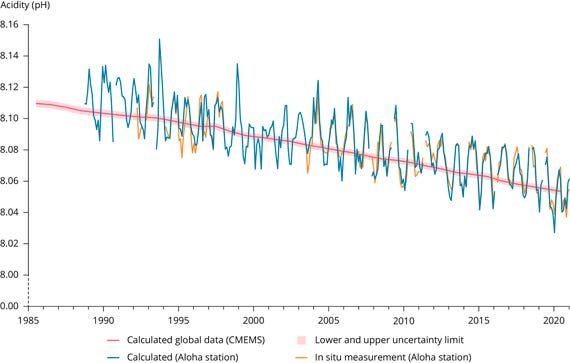How Oceans are becoming an Acid Bath
Oceans have saved us from the worst impacts of global warming but are turning acidic as a result of carbon pollution.
The oceans have absorbed around 90% of the extra heat from our carbon pollution which is why oceans are heating up. Oceans have done us another big favor by taking in about 30% of the CO2 we have emitted since 1890. (Approx 150 BILLION tons)
Need-to-Know: The oceans have kept land areas from getting far hotter than they already are.
And by keeping 30% out of the atmosphere, the oceans have prevented far worse extreme-weather events than we’ve experienced.
Lucky for us but bad for oceans.
When CO2 is dissolved in the oceans, carbonic acid is formed, depleting naturally occurring calcium carbonate. This is ocean acidification. It is simple, undisputed ocean chemistry. Every day, the oceans take in tens of millions of tons of CO2, gradually and inevitably increasing their acidity.
Need-to-Know: The oceans are now 30% more acidic.
Millions of years ago oceans were more acidic and supported very different creatures than today. However, the rate of acidification is about 100 times faster than any time in the last 55 million years.
Why ocean acidification—less calcium carbonate in seawater—is a big deal:
Many marine organisms, including coral reefs, oysters and shellfish, need high levels of calcium carbonate so they can grow their skeletons and shells.
Many types of plankton also form shells but can’t if there isn’t enough calcium carbonate.
Need-to-Know: plankton generates 50% of the oxygen we breathe.
Ocean acidity acts to acidify the internal tissues of fish and other water breathers, which is having sub-lethal effects. Some fish become hyperactive and confused.
Surprisingly, acidity will weaken seaweeds and increase their mortality if carbon pollution continues.
“I’ve been studying the impacts of ocean acidification for two decades and a tidal wave of ocean calamity is on the horizon.”
Steve Widdicombe, a marine scientist at Plymouth Marine Laboratory, October 16, 2024
You probably haven’t heard much about ocean acidification, so let me cite something I wrote in 2009, only a few years after its discovery:
And yet the indisputable fact that burning fossil fuels is slowly turning the oceans into an acid bath has been largely ignored by industrialised countries and their climate treaty negotiators, concluded delegates from 76 countries at the World Oceans Conference in Manado, Indonesia.
Unfortunately, there hasn’t been much focus on this, and few countries have any policies on it. The topic is rarely in the media.
Need-to-Know: The solution to ocean acidification is simple: Stop carbon pollution.
Simple but not easy. Here’s a list of steps needed to save ourselves, as recently suggested by some of today’s most prominent climate scientists:
National carbon prices followed by a substantial global carbon price.
Drastically cut methane emissions (details in an upcoming NtK issue)
Reduce material consumption in wealthy countries (that’s us).
Shift to plant-based diets.
Teach climate change to children and empower them to take action.
Finally, say thanks to the oceans because they’ve bought us time to get our act together. So lets use it.
Until next time, be well.
Stephen






Thanks for this good information!